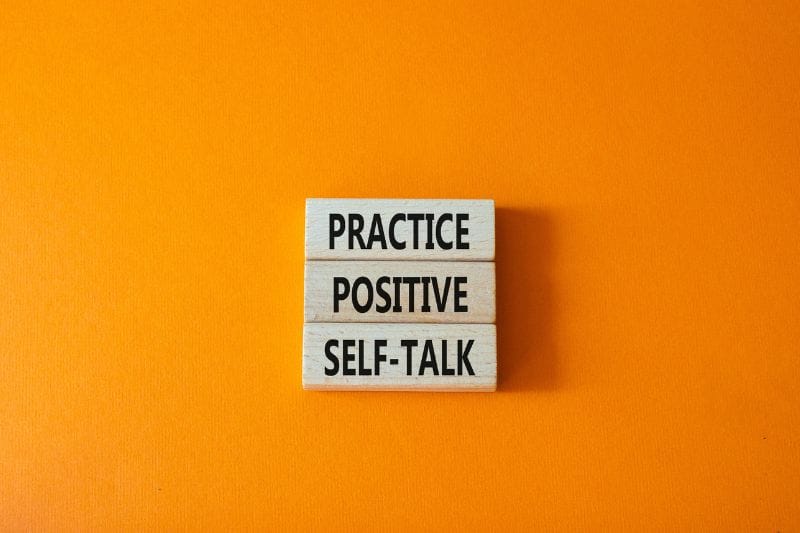Self-talk is the way we speak to ourselves in our own mind. It plays a powerful role in how we think, feel and act. Positive self-talk can build confidence, reduce stress and help you stay focused, while negative self-talk can hold you back or make challenges feel harder than they are. The good news is that self-talk is a skill you can improve. You might not control every thought that pops into your head, but you can learn to notice unhelpful patterns and shift them over time.
As an expert weight loss coach, it is something I use with both clients and myself!
In this blog, I’ll look at why self-talk matters, how to spot it, and simple ways to use it to your advantage in everyday situations.
This “voice” is something I am always working on! My nemesis at times, but I am getting better at it...
Why Is Self-Talk Important?
Self-talk is like having a personal coach or companion with you at all times. If it’s positive and encouraging, it can boost confidence, help manage stress, and keep you motivated. But if it’s negative or overly critical, it can sap your energy and make you feel stuck. The way you talk to yourself matters – so make it work in your favour.
How to Use Self-Talk
The key to mastering self-talk is becoming aware of what you’re saying to yourself and learning to flip negative thoughts into supportive ones. Here’s how:
- Notice Your Inner Dialogue: Pay attention to your thoughts, especially during stressful or challenging moments.
- Challenge Negative Thoughts: Ask yourself, “Is this thought true? Is it helpful?”
- Replace the Critic: Swap self-doubt or blame with constructive and kind words.
- Use Affirmations: Simple phrases like “I’ve got this” or “I am capable” can work wonders.
- Practice Gratitude: Shift your focus from what’s wrong to what’s going well.
Now, let’s look at how self-talk can make a difference in different areas of life.
Self-Talk for Anxiety
When anxiety creeps in, self-talk can calm your nerves.
- Negative Thought: “I can’t handle this.”
- Positive Reframe: “This feels tough, but I’ve faced challenges before and made it through.”
Try telling yourself, “One step at a time,” or “I’m doing my best, and that’s enough.”
Fitness and Exercise
Ever tried a workout and felt like giving up halfway? Positive self-talk can push you through.
- Negative Thought: “I’ll never be strong enough.”
- Positive Reframe: “Every rep makes me stronger. I’m improving with each session.”
During a tough set, say, “Keep going – you’ve done harder things before.”
Comfort Eating
If you’re struggling with comfort eating, self-talk can help you pause and make conscious choices.
- Negative Thought: “I’ve ruined my diet; might as well eat everything now.”
- Positive Reframe: “One snack doesn’t define my progress. I can stop now and feel good about it.”
Tell yourself, “I’ll have a glass of water and see how I feel in 10 minutes.”
Weight Loss
Weight loss journeys are full of ups and downs, but self-talk keeps you focused.
- Negative Thought: “This isn’t working. Why bother?”
- Positive Reframe: “Progress takes time. Small changes add up, and I’m on the right path.”
Remind yourself, “I’m building habits that last for life.”
Running
Whether you’re tackling a 5K or a marathon, self-talk can keep you going.
- Negative Thought: “I’m too tired to finish this.”
- Positive Reframe: “I’ve done hard runs before. I can take it one step at a time.”
Mid-run, repeat, “Strong and steady” or “I’m getting closer with every step.”
Cycling
Cycling uphill or hitting a wall in endurance rides can test your patience.
- Negative Thought: “This hill is impossible.”
- Positive Reframe: “It’s tough, but I’m tougher. I’ll take it pedal by pedal.”
Tell yourself, “I’ll reach the top, and it’ll feel amazing.”
Healthy Eating
When faced with temptation or tricky food choices, self-talk helps you stay on track.
- Negative Thought: “I can’t resist this cake.”
- Positive Reframe: “I can enjoy treats in moderation. I don’t have to eat it all.”
Remind yourself, “I feel my best when I eat balanced meals.”
Work
Stressful days at work can leave you feeling overwhelmed. Self-talk can help you stay focused and productive.
- Negative Thought: “I’ll never get through this to-do list.”
- Positive Reframe: “I can handle one task at a time. I’ll do what I can today.”
Say, “I’m capable and resourceful. I’ve solved bigger problems before.”
Family Life
Family dynamics can be tricky, but self-talk can bring calm to the chaos.
- Negative Thought: “Why is it always me sorting everything out?”
- Positive Reframe: “I’m doing my best for my family, and it’s okay to ask for help.”
Tell yourself, “I’m teaching by example. Patience is my superpower.”
So, self-talk isn’t about pretending everything is perfect. It’s about being kind, realistic, and supportive to yourself. Like any skill, it takes practice, but the payoff is worth it. Whether you’re managing anxiety, running a race, or dealing with work stress, your inner voice can be your biggest ally.
The next time your inner critic pipes up, pause and ask, “What would I say to a friend in this situation?” Then, say it to yourself! Be kind to yourself, you deserve it.
I can help you…
I am a Weight Loss Coach, successfully helping people just like you to lose weight and keep it off:
I am Fitness, Strength and Nutrition Coach for sports events and athletes – helping people like you to get fitter, stronger and faster:
Want to get stronger, fitter or gain muscle?




